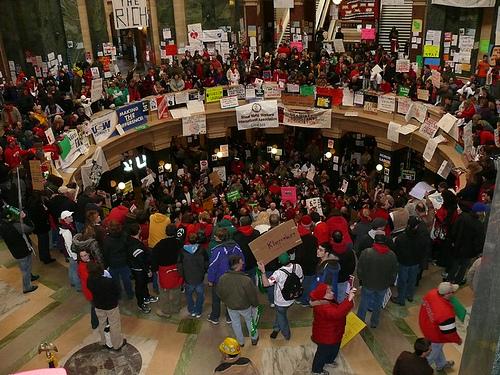The Institute for Policy Studies issues awards each year to heroes of the progressive movement. One goes to an outstanding group or individual in the United States. One goes to an international awardee.
This year domestic Letelier-Moffitt Human Rights Award will be presented to those who are gallantly fighting to preserve workers’ rights and dignity in Wisconsin. Their protest began as a response to right-wing Gov. Scott Walker, who took office in January. Encouraged by the Koch Brothers and their conservative front organizations, he has already implemented several unjust proposals, including choke-hold controls on public sector bargaining, restraints on union activity in elections, and strict Voter ID requirements that significantly restricted voting by college students, the elderly, the poor, and immigrants.

Thousands made their voices heard in the Wisconsin State Capitol. Photo by RickPoll.
MTI Executive Director John Matthews said that MTI’s elected leadership took action immediately upon learning of Walker’s intended legislation, knowing that the proposal, if not stopped, would destroy the progress made by Wisconsin’s unions over the past 50 years, and the ability of unions to effectively represent their members. Their action closed Madison’s schools for four days, while members engaged in political action in an attempt to stop Walker’s regressive legislative proposal. MTI’s members continue to take action against this regressive legislation.
Matthews and MTI President Peggy Coyne will receive the award at the Oct. 12 ceremony. Matthews has served as the union’s executive director for 43 years, the longest tenure in the country, while Coyne, a senior member of the union’s bargaining committee, as well as its president, is a middle school teacher.
Early union action was taken by MTI, which was joined within the first day of protests by students from the University of Wisconsin and the Madison Metropolitan School District, Madison Firefighters, Local 311, Madison Police Officers Association, the American Federation of State, County and Municipal Employees, and later by numerous local, state-wide and international unions representing other teachers, and public and private sector workers. Many progressives, both from Wisconsin and the surrounding states, participated daily. During the demonstrations in February and March, even though it was bitter cold and snowing, crowds swelled daily, regularly exceeding 100,000, and at times they were up to 135,000.
Bitterness toward Walker’s proposed legislation grew. Democratic members of the State Assembly moved their desks onto the Capitol lawn to enable easier discussions with protesters, and Democratic members of the Senate fled to Illinois in order to delay passage of the bill through flagrant violation of legislative rules. Without the Democratic Senators, the majority Republicans lacked a quorum to approve the governor’s proposal.
Walker’s Secretary of Administration called in the Madison Police and the Dane County Sheriff Department to supplement Capitol Police in response to the tens of thousands of demonstrators who were occupying the Capitol. When the governor requested that the Sheriff direct his officers to remove demonstrators, Sheriff Dave Mahoney, a former labor leader, refused, stating that his deputies were “not palace guards.”
Given their refusal to quash the protesters’ rights, Madison’s police chief and the Dane County sheriff were temporarily excluded from security planning meetings, which by that time included officers from police and sheriff departments across the state, as well as the University of Wisconsin, the State Patrol, prison guards, and wardens from the Department of Natural Resources. Demonstrators occupied the Capitol 24 hours per day for three weeks — and without major incident. There were sing-alongs, as many brought musical instruments, and there was chanting, “Tell me what democracy looks like! This is what democracy looks like!” and “What’s disgusting? Union Busting!”
Those occupying the Capitol received food, coffee, and other refreshments, courtesy of local pizza parlors and restaurants or paid for by sympathizers from across the globe, who phoned local providers offering payment via credit card. At last count, supporters from over 50 countries, including Egypt and Iran, had donated. Two local coffee houses delivered 80 gallons of coffee at a time, as snow and cold temperatures daily greeted the demonstrators. Demonstrators, including those occupying the Capitol, organized their own cleaning crews, food distribution, and first aid centers.
Participation in the demonstrations increased as Walker and the Republican-majority legislative leadership attempted to circumvent legislative rules in moving the proposed legislation forward. A bogus committee was established to recommend the proposal and move it to the floor of the Assembly for a vote. “Shame! Shame!” shouted Assembly Democrats. After passage, the leaders of the Democratic minority held a press conference and condemned the action. Before the Democratic Senators returned from their three-week stay in Illinois, the Senate Republican majority approved the proposals and Gov. Walker immediately signed the bill.
The legislation puts at risk the five-day work week, the 40-hour work-week, weekends off, work-place safety, worker justice, and due process, due to lack of union representation. It also enables school boards to negate prior collective bargaining agreements to which they had agreed by increasing the number of school days, as well as the number of hours in a school day, and to do so without additional compensation for the added days/time — some school boards have added as many as 20 days’ work. One school board in suburban Milwaukee has gone so far as to institute a work rule that female teachers’ dresses and skirts have to be “below the knee,” rolling back conditions of employment to the 1960’s.
Public-sector employers are now prohibited by Walker’s law as to how much they can pay toward employees’ health insurance premiums and pensions. This has caused employees’ take-home pay to be reduced up to 15 percent below that paid under the previous collective bargaining agreements agreed upon by the public employers and the unions as part of the compensation package. Walker’s law makes it illegal for public employers to pay various benefits that were previously part of the state’s collective bargaining agreement. Obviously, right-wing critics did not mention the negative impact on the economy of the loss of disposable income to public employees.
Further, Walker’s law makes it illegal for public employers to negotiate anything except wage increases with the workers’ unions, and that is restricted to not greater than the increase in the cost of living over the year; i.e. all other previously agreed-upon conditions of employment are now under the employers’ control. All public employees in Wisconsin are adversely affected by Walker’s law. Yes, 50 years of progress for Wisconsin’s public workers, those who teach the kids, plow the streets, purify the water, and run the court system, as well as for the police officers and firefighters who protect the public, are gone.
Signs at the demonstrations made clear the contempt Wisconsinites have for Gov. Walker. They read “Protest like an Egyptian,” “Hosni Walker,” (Wisconsin’s protests followed shortly after the uprising against the Mubarak regime in Egypt), and “Walker — Union Buster.” A teacher held a sign, “Walker’s Report Card — Does Not Play/Work Well With Others” and “Don’t WALKer on Us!” A child’s sign said it all, “Save the Middle Class.”
How did Gov. Walker decide to wage this war against his constituents? Through encouragement by the Koch Brothers. Walker capitulated to the anti-worker agenda of the American Legislative Exchange Council (ALEC), financed by the Koch Brothers. The Koch Brothers also created and are the primary financiers of Americans for Prosperity, enabling electioneering and legislation which make the very rich even richer, and at the expense of the poor and the middle class. The Kochs are among America’s richest — that 1 percent of Americans who control 40 percent of the wealth.
As workers have built unions in this country over the past century, legislation has often been developed to try to control them, like the Taft-Hartley Act, and its “cooling-off” period supposedly to give the parties time to resolve labor disputes in lieu of strikes, but in reality cutting back a union’s bargaining power. The ALEC proposals, as fronted by Gov. Walker, are the first to make it illegal for an employer to negotiate with a union elected by its members.
Wisconsin’s progressive movement will press forward. Already, two members of the Republican majority in the state Senate have been recalled, and more recall elections are planned, including for Scott Walker. While organizers can’t officially gather signatures for that until November, one year after his election, tens of thousands have already signed their pledge to sign the governor’s recall petition.
